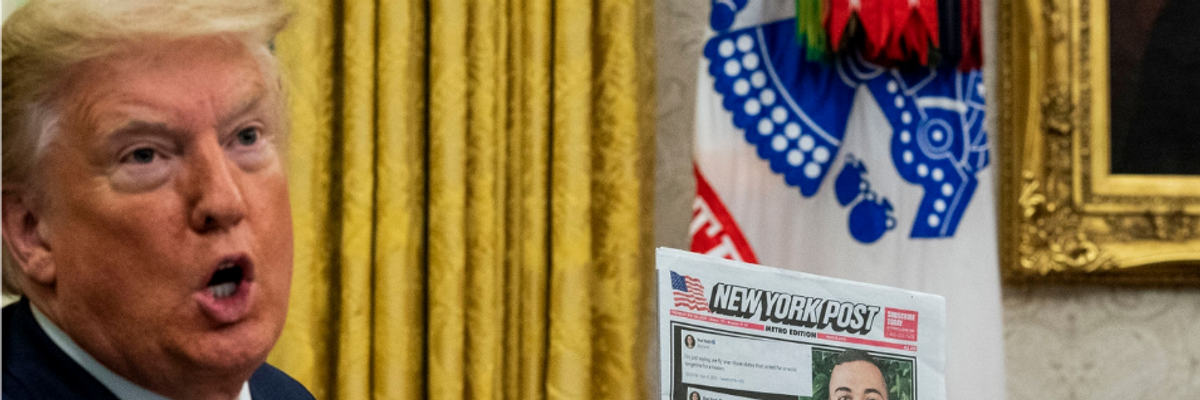One of the most consequential--and for some confusing--pieces of internet legislation of the past 25 years has been the subject of white-hot political debates in Washington this election year.
And no one seems more confused by Section 230 than Donald Trump, who in May signed an executive order to undermine this seminal law and force social-media sites to amplify his lies and propaganda with little fact checking or contextualizing.
Trump's move was well timed, for him at least. It came as he and other bad-faith political actors were preparing to unleash unprecedented levels of garbage online in advance of the November election.
"Private platforms like Facebook, Twitter, and YouTube that host third-party content need legal protection if they hope to stop the spread of this flood of disinformation and correct the record before the falsehoods and conspiracy theories subvert our democracy and potentially spark more violence."His latest attack against social-media companies came after Twitter attached a fact-checking link to an inaccurate presidential tweet about the legality of mail-in voting.
Private platforms like Facebook, Twitter, and YouTube that host third-party content need legal protection if they hope to stop the spread of this flood of disinformation and correct the record before the falsehoods and conspiracy theories subvert our democracy and potentially spark more violence.
The First Amendment and Section 230
Upon signing the executive order, Trump claimed he was taking this action in the name of the First Amendment to prevent online censorship. Don't believe it.
Online platforms and websites have the First Amendment right to manage content on their services without heavy-handed government interference. This includes the right to establish rules against third-party content that platforms deem harmful to their users. While Free Press Action has criticized the ways platforms moderate content--and through our work with the Change the Terms coalition made strong recommendations on how they can fix this--we don't question their constitutional right to do so.
Congress made Section 230 the law in 1996 in part to shield websites from legal liability for the material users post on their platforms. Section 230 also gives these sites the leeway they need to moderate content that violates their community standards.
Lawmakers needed only 26 words to describe the main tenet of Section 230: "No provider or user of an interactive computer service shall be treated as the publisher or speaker of any information provided by another information content provider."
This provided the safeguards that online hosts of third-party content need to grow online communities and allow users to post content and share it with others. Some obvious beneficiaries include Facebook, Twitter, and YouTube. But Section 230 has also benefited smaller online platforms and publications, including any online news site like Common Dreams, that lets readers comment on every story it publishes. Section 230 lets users interact with these sites--and frees sites and their lawyers of having to vet and approve each and every third-party post.
Seems fairly straightforward, right? But Section 230 has run headlong into a Trump administration determined to stifle all criticism of the president and ensure that social media remain tools for the unchecked spread of the president's brand of disinformation and bigotry.
As a follow-up to Trump's order, three Republican senators last week introduced legislation that would restrict the protections Section 230 grants to online platforms. If passed, the proposed bill would undermine online platforms' ability to remove posts containing voter-related disinformation, calls for armed violence against racial-justice protesters, and false COVID-19 treatments, among other topics.
A similar effort is underway at the Federal Communications Commission, which could lead to the agency restricting the scope of Section 230. The process is being led by the agency's chairman and far-right commissioner who've in the past bent over backwards to serve Trump.
Both government efforts are naked attempts to silence anyone who dares correct or criticize Trump and his enablers. "They're as blatantly outrageous as they are unconstitutional," Free Press Action's Senior Policy Counsel Gaurav Laroia said about the GOP bill in the Senate and the FCC process.
Drowning in Toxicity
"The bill would greatly limit the ability of websites and platforms to set their own standards for their online communities." Laroia said. "It would practically require platforms to host content created by racists, sexists, propagandists and trolls. This legislation forces platforms and users to carry much more 'lawful but awful' content and keep a door open to those who want to drown the internet in an ocean of disinformation and toxicity."
Section 230 enables websites and users, regardless of size, to tend to their own gardens and set standards for the kinds of discourse they would like to have without having the government peering over their shoulders.
Free Press Action is pushing platforms to do more to combat online hate and disinformation. We know that keeping Section 230--rather than radically altering it in the ways envisioned by Trump and his allies in Congress and at the FCC--is the best way forward. "That may sound counter-intuitive," Laroia said, "but only because of the confused conversation about this law in recent years."
Maintaining Section 230 preserves the free expression of ideas online. It lets people of every stripe create moderated communities without racists and trolls shouting down or drowning out their discussions.
The Trump administration's attack on Section 230 would end such online diversity while turning social networks into a free-for-all of hatred, fear-mongering and other pro-Trump propaganda.
